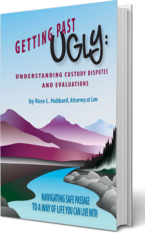
If You're at the End of Your Rope & Need a Knot, Grab On!
This step-by-step guide will show you a way to gain resilience, calmness and clarity as you navigate safe passage through the universal experience of custody disputes.

Rose L. Hubbard, who has seen “the ugliest of the ugly” in her 30 years of family law practice, reveals the good, the bad, and the ugly about the custody process. Her candid approach helps you recognize each landmark as it comes, so you can use the information you need at the time you need it. The four-step Parenting Mantra will help you clarify and apply essential facts and goals.
“By understanding the custody evaluation process and the factors that go into a custody decision, you will better understand what you can do to successfully make decisions for the benefit of your child. You will learn how to identify what is your issue and what is your child’s issue, and make decisions that are about your child,” explains Rose.
Driven by a deep sense of compassion and fairness, Rose provides practical advice, laugh-out-loud stories, and comforting wisdom to protect you from getting crushed. Through examples and anecdotes, she shows you how to figure out what’s going on, face the truth, and stay focused so you don’t feel emotionally devastated.
"At the end of the custody process, you will feel that you made good choices that benefited your child. You will recognize what you have control over and what you don’t have control over. You will be a better parent with a sense of hope, well being, and a better relationship with your child. Then, you will have created a way of life you can live with."
At some point in talking to your friends, your family, your colleagues, complete strangers telling you about their divorce, they will tell you that it was “ugly.” What makes a divorce emotionally ugly is custody disputes. We, as parents, have a great deal of identity and emotions tied up in our kids. From the time they are born, we want what’s best for them. And when you get divorced, each parent may have very different ideas about what is best for your children. That’s where it can get ugly.
Custody disputes are ugly and painful and frightening. No one ever wants to give up any time with their children. But by understanding what goes into making a custody and parenting plan, this book can help keep you focused on what is best for your child, rather than your own fears, anxiety and pain.
I get asked frequently whether it is depressing being a divorce attorney. After all, a divorce is one of the most painful losses that you can experience, even more than the pain of losing a family member. As a divorce attorney, I see the ugliest of the ugly every day. Somewhere along the line, your life has gotten off track, heading in a direction that you don’t want to go. But I also see the divorce process and the custody dispute process as a way to get your life back on a track that is healthy for you. I have the opportunity to assist in that process in a way that minimizes the damage to your children.
My hidden client is your child. I assume that you want what’s best for your child, and you want help to get there. Sometimes custody disputes are so ugly that people are traumatized for years and cannot get past their pain and loss. If I can make that process a little less traumatic, if I can help you build a little more resilience, so that you do not experience trauma for years after the divorce, then I’ve accomplished my goal in representing you as a client and in writing this book.
This book helps you learn a process to be better prepared, to be more resilient going through the process and to transition into a new family structure. I don’t like the term “broken families.” Your family is not broken because you are getting divorced. You are restructuring your family.
Many books on custody disputes focus on either the unrealistic “let’s just all get along and be happy” approach, or on the “how to kill your opponent in the battle” approach. This book gives you information that will help you better communicate what is important to you about your child and what you believe needs to happen in the best interests of your child, so that you can navigate an emotionally safe passage in a practical way.
